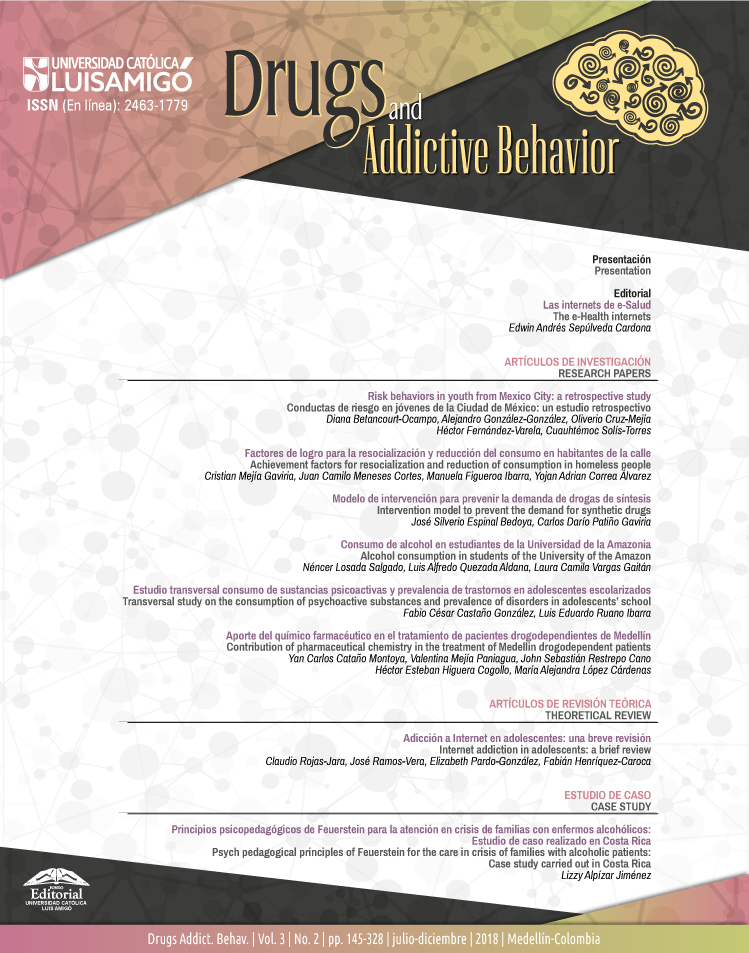Editorial: Las internets de e-Salud
DOI:
https://doi.org/10.21501/24631779.2866Palabras clave:
E-salud, Internet, Tecnologías de la Información y las ComunicacionesResumen
Internet es un gran laboratorio de exploración, un LAB para todos los ensayos posibles, porque, como dice Friedman (2012), aún está en una fase beta. Estamos experimentando: los ciudadanos conectados, los nuevos ingenieros y los nuevos profesionales de la salud.
En los laboratorios de Internet se están fraguando todo tipo de iniciativas. La efervescencia de una civilización hiperconectada -si acaso- nos permite inventariar los cocteles digitales que se desarrollan a diario, ya sea desde un garaje (como se forjó Sillicon Valley) o en una clínica especializada con los recursos de un Estado o de alguna organización supranacional.
Descargas
Referencias
Bebster, R., (Productor). (2016). Black mirror [serie de televisión]. Londres: Zeppotron.
Friedman, T. L. (2012). La tierra es plana. Breve historia del mundo globalizado del siglo XXI. Madrid,. España: Ediciones Martínez Roca.
Harari, Y. N. (2017). De animales a dioses. Breve historia de la humanidad. Barcelona: Debate.
IMDb, Inc. (2016). IMDb.com, Inc. (Black Mirror. San Junípero). Seattle: Amazón. Recuperado el 10 de mayo de 2018 de https://www.imdb.com/title/tt4538072/?ref_=ttep_ep4
Martel, F. (2014). Smart: Internet(s), la investigación. Madrid: Taurus.
Sepúlveda Cardona, E. A. y Restrepo Escobar, S. M. (2018). e-Salud y el estado de las Apps para adicciones: un análisis articulado de los cibermedios para ecosistemas digitales pensados a la Atención Primaria en Salud. Health and Addictions/Salud y Drogas, 18(2), 185-194. https://doi.org/10.21134/haaj.v18i2.366
Descargas
Publicado
Cómo citar
Número
Sección
Licencia
DERECHOS DE AUTOR Y ACCESO A LA PUBLICACIÓN
Derechos de autor
El autor o autores pueden tener derechos adicionales en sus artículos según lo establecido en su acuerdo con el editor. Los autores son moral y legalmente responsables del contenido de sus artículos, así como del respeto a los derechos de autor. Por lo tanto, éstos no comprometen en ningún sentido a la Universidad Católica Luis Amigó ni a su Fondo Editorial.
Licencia
La revista y los textos individuales que en esta se divulgan están protegidos por las leyes de copyright y por los términos y condiciones de la Licencia Creative Commons Atribución-No Comercial-Sin Derivar 4.0 Internacional. © 2018 Universidad Católica Luis Amigó.
Publicación y divulgación
- La revista completa y los textos individuales se publican en formatos PDF en el Open Journal Systems (en el siguiente link: http://www.funlam.edu.co/revistas/index.php/DAB/issue/archive). Asimismo, Drugs and Addictive Behavior cuenta con Digital object identifier (DOI) tanto para los números completos como para los artículos, lo que facilita su localización en internet, herramienta que garantiza la preservación de acceso al contenido de la revista en el caso de que deje de publicarse.
- Una vez se aprueba la inclusión de los textos en la revista, se genera la publicación anticipada, con el propósito de responder a las necesidades de vigencia del contenido y a los requerimientos de los autores y del medio. Esta edición provisional contiene la última versión enviada por los autores, sin que aún se haya realizado la corrección de estilo, la traducción ni la diagramación.
- La revista Drugs and Addictive Behavior utiliza, entre otros medios, las redes sociales y académicas para la divulgación de su contenido.
Periodicidad de la publicación
Drugs and Addictive Behavior es una publicación seriada de carácter semestral. Publica dos números por año correspondientes a los periodos enero–junio y julio-diciembre.
Recepción de contribuciones
Los textos propuestos se remiten mediante el Open Journal Systems (OJS), software de administración y publicación de revistas que permite el seguimiento a los documentos en sus distintas etapas o al correo electrónico drugsaddictivebeh@amigo.edu.co, los envíos en línea requieren de usuario y contraseña, que pueden solicitarse en http://www.funlam.edu.co/revistas/index.php/DAB/about/submissions#onlineSubmissions
- No se recibirán artículos impresos. Las consultas para la remisión pueden enviarse al correo electrónico de la revista (drugsaddictivebeh@amigo.edu.co).
- La dirección de la revista dará respuesta en un máximo de tres (3) días acerca de la recepción de la contribución.
- El autor debe diligenciar la manifestación de cesión de derechos patrimoniales y declaración de conflictos de intereses (suministrado por la dirección de la revista), con lo cual cede todos los derechos del artículo a la revista Drugs and Addictive Behavior.
- No se recibirán versiones parciales del texto, es decir, aquellas que no estén estructuralmente ajustadas al tipo de artículo.
- Una vez enviado el artículo, se entiende que el autor autoriza la publicación de los datos personales relacionados en la nota de autor.
- La recepción de artículos no obliga a la revista a publicarlos.


